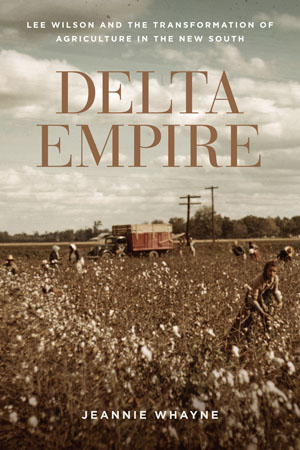Historian Publishes Book on the Arkansas Delta

Delta Empire: Lee Wilson and the Transformation of Agriculture in the New South (LSU Press, 2011)
In Delta Empire: Lee Wilson and the Transformation of Agriculture in the New South, historian Jeannie Whayne of the University of Arkansas employs the fascinating history of a powerful plantation owner in the Arkansas Delta to recount the evolution of southern agriculture from the late 19th century through World War II.
After his father’s death in 1870, Robert E. “Lee” Wilson inherited 400 acres of land in Mississippi County, Arkansas. Over his lifetime, he transformed that inheritance into a 50,000-acre lumber operation and cotton plantation. Early on, Wilson saw an opportunity in the swampy local terrain, which sold for as little as fifty cents an acre, to satisfy an expanding national market for Arkansas forest reserves. He also led the fundamental transformation of the landscape, involving the drainage of tens of thousands of acres of land, in order to create the vast agricultural empire he envisioned.
A consummate manager, Wilson employed the tenancy and sharecropping system to his advantage while earning a reputation for fair treatment of laborers, a reputation—Whayne suggests—not entirely deserved. He cultivated a cadre of relatives and employees from whom he expected absolute devotion. Leveraging every asset during his life and often deeply in debt, Wilson saved his company from bankruptcy several times, leaving it to the next generation to successfully steer the business through the challenges of the 1930s and World War II.
Delta Empire traces the transition from the labor-intensive sharecropping and tenancy system to the capital-intensive plantations of the post-World War II era. Through Wilson’s story Whayne provides a compelling case study of strategic innovation and the changing economy of the South in the late nineteenth century.
Advanced praise for Delta Empire is rolling in: Michael Honey, author of Martin Luther King's Last Campaign, describes Whayne's book as a "remarkable portrait of how the Lee Wilson family created a plantation empire of over 50,000 acres and 2,500 workers in the eerie sunken lands of white supremacy of the Mississippi River Delta of Arkansas — and how African Americans, poor whites, and plantation owners struggled over the consequences. This is an exceptional study."
Contacts
Lynda Coon, Chair
Department of History
575-5896,
llcoon@uark.edu
Headlines
Affairs of the Heart
Find out how biomedical engineering professor Morten Jensen is developing innovative devices to produce better outcomes in cardiovascular medicine.
Students, Faculty and Alumni Kick Off Centennial Year of School of Law
Founded April 14, 1924, the School of Law faculty, students and alumni started the celebration of its centennial year with a Founders Day event and will continue with more commemorative events this coming fall.
Yearly Academic Award Winners, Ambassadors Recognized by Bumpers College
Schyler Angell, Lexi Dilbeck, Cason Frisby, Tanner Austin King, Anna Brooke Mathis, Carrie Ortel, Lucy Scholma, Kadence Trosper and student ambassadors were honored at the college's annual reception.
World Premiere of 'Cries from the Cotton Field' Slated for May 8
Cries from the Cotton Field chronicles the journey of 19th century Italian immigrants from northern Italy to the Arkansas Delta and ultimately to Tontitown. It will premier at 6 p.m. May 8 in Springdale Har-Ber High School.
Fay Jones School's Earth Day Event Spotlights Sustainable Materials and Projects
"One day doesn't seem like a lot, but one day can empower individuals and groups, energize them to work for change and innovate for transformative solutions," professor Jennifer Webb said of the students' design work.




